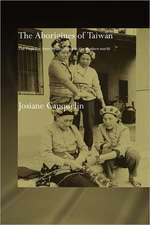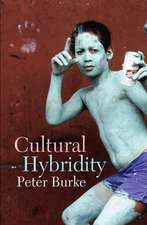Postsocialism: Ideals, ideologies and practices in Eurasia
Editat de C. M. Hannen Limba Engleză Paperback – 6 dec 2001
Postsocialism presents, for the first time, the anthropological responses to these problems which are all grounded in intensive fieldwork. The authors demonstrate that even when local conditions are specific, the view 'from below' illuminates macro trends. A wide range of topics are discussed, including:
*the role of social and cultural capital in determining the 'winners' of rural decollectivization
*the devaluation of blue collar labour
*the position of Gypsies
*the viability of 'multicultural' models in situations of religious differences and ethnic violence
*new patterns of consumption in China
*the revival of rituals and the healing of socialist 'trauma'. _
| Toate formatele și edițiile | Preț | Express |
|---|---|---|
| Paperback (1) | 420.26 lei 6-8 săpt. | |
| Taylor & Francis – 6 dec 2001 | 420.26 lei 6-8 săpt. | |
| Hardback (1) | 1007.36 lei 6-8 săpt. | |
| Taylor & Francis – 6 dec 2001 | 1007.36 lei 6-8 săpt. |
Preț: 420.26 lei
Nou
Puncte Express: 630
Preț estimativ în valută:
80.42€ • 87.63$ • 67.76£
80.42€ • 87.63$ • 67.76£
Carte tipărită la comandă
Livrare economică 23 aprilie-07 mai
Preluare comenzi: 021 569.72.76
Specificații
ISBN-13: 9780415262583
ISBN-10: 0415262585
Pagini: 360
Dimensiuni: 156 x 234 x 20 mm
Greutate: 0.55 kg
Ediția:1
Editura: Taylor & Francis
Colecția Routledge
Locul publicării:Oxford, United Kingdom
ISBN-10: 0415262585
Pagini: 360
Dimensiuni: 156 x 234 x 20 mm
Greutate: 0.55 kg
Ediția:1
Editura: Taylor & Francis
Colecția Routledge
Locul publicării:Oxford, United Kingdom
Notă biografică
C. M. Hann is Founding Director of the Max Planck Institute for Social Anthropology, which specialises in studies of postsocialist countries. His book Socialism was published by Routledge in 1992.
Cuprins
Preface and Acknowledgements 1. Introduction: Postsocialism as a Topic of Anthropological Investigation (i) Farewell to the socialist 'other' Chris Hann, (ii) Does the category 'postsocialist' still make sense? Caroline Humphrey (iii) Whither postsocialism? Katherine Verdery Part One: Social Capital, Trust and Legitimacy 2. The Advantages of Being Collectivised Martha Lampland 3. Economic Crisis and Ritual Decline in Rural Eastern Europe Gerald Creed 4. The Social Production of Mistrust Christian Giordano and Dobrinka Kostova Part Two: Dimensions of Inequality: Gender, Class and 'Underclass' 5. Retreat to the household?: Gendered Domains in postsocialist Poland Frances Pine 6. The Unmaking of an East-Central European Working Class David Kideckel 7. Deprivation, the Roma and 'the underclass' Michael Stewart Part Three: Violent Histories and the Renewal of Identities 8. Intolerant Sovereignties and 'Multi-Multi' Protectorates: competition over religious sites and (in)tolerance in the Balkans Robert Hayden 9. Withdrawing from the Land: social and spiritual crisis in the indigenous Russian Arctic Piers Vitebsky 10. Remnants of Revolution in China Stefan Feuchtwang Part Four: Stretching Postsocialism 11. Rethinking Chinese Consumption: social palliatives and the rhetorics of transition in postsocialist China Kevin Latham 12. How Far Do Analyses of Post-Socialism travel?: the case of Central Asia Deniz Kandiyoti 13. 'Eurasia', Ideology and the Political Imagination in Provincial Russia Caroline Humphrey Part Five: Democracy Export and Global Civil Society 14. Seeding Civil Society Ruth Mandel 15. Post-Post-Socialism and the New New Elites: project society in the Balkans Steven Sampson 16. Afterword: globalism and postsocialist prospects Don Kalb Index
Descriere
Social scientists did not predict the collapse of the socialist system in 1989-91 and their attempts to explain postsocialism have not been comprehensive. Postsocialism presents, for the first time, the anthropological responses to this.













